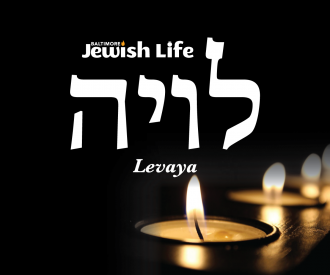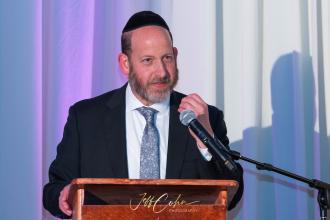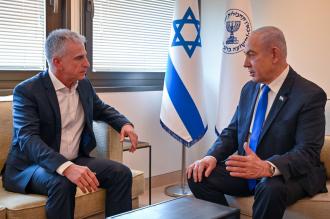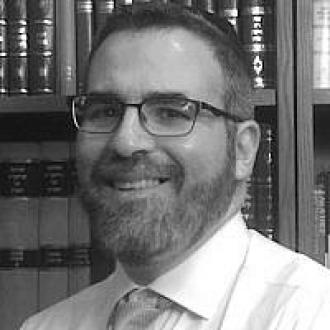There was once a flag boy in Russia whose job was to wave a lantern and direct the trains. One night a mistake occurred which resulted in a derailment. The flag boy was brought to court to answer for his mistake.
The judge inquired, “Young man, were you by the tracks Monday night at 10:00 pm?”
“Yes, your honor,” he replied.
“Did you see the oncoming train?”
“Yes, your honor.”
“Did you wave the lantern?”
“Yes, your honor.”
Hearing this, the judge brought down his gavel and declared the boy innocent. “Case dismissed.”
The prosecuting lawyer jumped up in exasperation, “Judge, you forgot the most important question! You didn’t ask if the lantern was lit. Waving a lantern without the fire inside is meaningless!”
When God commanded Moshe to instruct Aaron regarding the proper method of lighting the Menorah, the Torah records that, “Aaron did so… just as God commanded Moshe.” What a strange observation! Who could have imagined that Aaron would have failed to follow God’s instructions precisely?
Who among us would not do as God commands, particularly when the instructions are so direct and personal? Rashi suggests that the purpose of the Torah’s report is, “…to tell the praise of Aaron– that he did not act differently from what he was bidden (shelo shinah)”. But why highlight that the High Priest did not act differently from what he was bidden, that he had not done the wrong thing?
The Torah’s record and Rashi’s comment seem to presume we would doubt Aaron’s fealty to God’s command. As a result, we are left to wrestle with the report – are we to understand it as praise or chiding dismissal for Aaron, High Priest of Israel?
He did, after all, what he was supposed to do. And yet… and yet, despite his esteemed stature, Aaron was, just like you and I, a human being. Fallible. Easily distracted. Too often weak. And so, to see him going about his priestly responsibilities day in and day out, every day, the very same responsibilities to be done in the exact same way for thirty-nine years with the same fervor that possessed him when he first assumed the priesthood is more than a little impressive. It is astonishing and inspiring.
We know that people suffer from repetitive stress syndrome in a myriad of ways. Physically, we suffer from carpal tunnel syndrome to arthritic backs and knees. Psychologically, we experience anxiety and depression and lowered self-esteem.
Who among us, attending to the very same tasks in the very same way day in and day out for one year – let alone thirty-nine – would not suffer some debilitating form of repetitive stress? Who among us would not feel the effects of “professional burnout”?
It would not be surprising if we did. After all, we are human beings, not robots.
Like the Russian boy in our story above, the very repetitive nature of our responsibilities often causes us to “miss a step.” Our minds grow lazy. We grow distracted. We cut corners, consciously or unconsciously. We find ourselves on “autopilot” and never even realize our performance has been compromised.
None of us is immune from this. Even brilliant surgeons have been shown to sometimes miss a vital step that results in a terrible mistake. Wrong organs are removed. Left knees are replaced instead of right ones. For this reason, many hospitals insist on specific checklists being accomplished in writing.
Yet for Aaron, his priestly responsibilities never became rote; his priesthood never became merely a job. He never cut corners. Even as his prestige grew, even as his stature rose, even as he enjoyed what we might call “job security” he never ceased to be the same humble servant of God; never ceased to be the man who, when initially approached to serve, expressed fear and apprehension.
Lo shinah.
In this devotion to his task, more than our High Priest, Aaron is our teacher. The prophet Malachi declares, “The Kohen’s lips shall keep knowledge and they shall seek the Torah from his mouth, for he is the messenger of the Lord.” Based on this prophetic doctrine, the Rambam codified into law, “If the teacher is like an angel of the Lord of Hosts, they may seek Torah from his mouth. But if he is not, then they shall not seek Torah from his mouth.”
As devoted teacher Aaron is more human, and perhaps more inspiring than as High Priest. For in teaching too often “the lantern continues to be waved” long after the flame within has burned out.
We get it. Teaching is hard work. To be called upon, day in and day out, to teach the same lessons from the same pages in the same books, in the same place… often to students who do not want to be taught.
How could it not be that a once enthusiastic and idealistic classroom teacher eventually finds himself in a rut, unable to motivate himself, let alone his students? Day after day, year after year, the same lessons, the same assignments, the same materials and the same tests. Even as the students come and go, they too take on a sameness. The names change, but they are really the same. Day after day…
How painfully ironic! The teacher, the very person who must remain a source of inspiration and illumination, is precisely the person who most quickly suffers the devastating effects of burnout. The teacher must recognize his students as being unique, changing from hour to hour and day to day, not just from term to term!
The teacher is the very person who we desperately need to not suffer from burnout.
Perhaps that is why it is of note that the Torah reports that Aaron did just as he was told – even after thirty-nine years. As teacher, Aaron continued to display the same devotion, excitement and drive that he had displayed as he faced his very first class!
Our teachers are asked to perform a vital task, to nurture the flame of knowledge and understanding in their students. Only parents have a more essential role in guiding a child from youth to adulthood. In truth, when it comes to Torah knowledge, teachers often require and have the greater skill set and knowledge base. Therefore, it is so important that teachers take their cue from Aaron and attend to their responsibility with the same passion and exactitude on their last day of teaching as their first.
But the task is tough. Even the best teacher struggles with the challenges of teaching. Every day. The classroom can be such a daunting place. Imagine then what is might be like to teach without a classroom!
What do teachers do when the doors to our schools, yeshivas, chadorim are slammed shut? What does the best of teachers do in this time of Corona? Since Purim time until the end of the term there are no classrooms, no formal structure; no “educational platform” familiar and comfortable for our teachers or students.
How can our teachers and rebbeim be expected to maintain an Aaron-like posture and mindset?
What to do?
Throwing up our hands and surrender is not an option. Our students must learn. Our goals and aspirations must be maintained; no shinah! But that small step in front of the Menorah must now be adjusted. There must be some small change. Now the Kohen must teach via Zoom or YouTube; by phone or computer.
It is easy to complain about the ways our teachers are lacking but what do we do now, when the entire educational framework is turned upside down overnight! What do we do when lo shinah is not an option in the way we’ve always understood it to be?
The truth is, our heads of school, our teachers and our students have outdone themselves in these most challenging circumstances.
Throughout our long history, whatever else has befallen us, our teachers have been able to consider a student’s eyes and engage.
Now, our teachers must peer through virtual portals to reach their students.
When, in the Torah, Aaron is instructed to light the Menorah, he is not instructed to simply kindle (l’hadlik) the lights; he is instructed Beha’alotecha – to cause the lights to rise. This is the essential gift of the teacher, to kindle the flame within his students so that, as Rashi suggest, “…the light ascends of itself.”
To teach well means to enlighten, inspire, motivate and raise students to the point at which their inner flames automatically ascend – because of the teacher’s kindling. Students must ultimately become reflections and mirrors of great teachers. Furthermore, our Rabbis derived from the expression Beha’alotecha that there was a step in front of the Menorah upon which “the priest stood while putting the lights in order.”
“Virtual” teaching is hard. Some parents complain about their sons and daughters spending too many hours in front of computer screens. Others, of not enough.
But, does remote learning work?
It is clear that much less content can be communicated. And the sense of community that exists and is transmitted in class and assembly is gone. But the flame must continue to be fanned. Beha’alotecha! A community, a soul must be nurtured!
The challenges are incredible. Just listen to the insights of some of my grandchildren to get an idea of what this new model feels like.
My granddaughter, Rachel Safran, is in the 10th grade, “I think the truth is that it is less about the teachers’ attitudes, and more about what they were teaching. For example, the teachers who understood that we can’t focus to the same extent through Zoom were able to be a little less pressuring, so it was a little easier. But the teachers who taught the same exact way as the classroom… it is extremely difficult. I can’t possibly focus so much and do as much work as I would in the normal classroom. It was definitely weird at first, because I had no idea what to expect…”
My grandson, Yosef Farbman, tells me that, “…overall, the teachers knew that it was harder to learn with zoom, so they adjusted accordingly. They gave less homework, let us out earlier and explained things a bit more thoroughly. They also tried being more enthusiastic. For the first few weeks it was definitely weird, but now I’ve gotten into a schedule so it’s the new normal.”
Weird. Strange. Odd. Uncomfortable even. This is how teachers and students came to this learning platform. Our teachers have had to find a way to reach them, to fan that flame!
My granddaughter, Tehilla Kletzel, is in the 9th grade in Modiin, Israel. Her experience has been similar to her American cousins, but she notes even greater challenges teachers face.
“I think for the teachers it was very intense... there was the concern that what they’re trying to deliver wasn’t delivered in the right way or that no one was listening. Most students chose not to show their faces- which means that the teachers were teaching to black screens, they weren’t seeing the faces of the students which was definitely a challenge. It’s harder to run a discussion- listen to other people’s opinion in class because you can’t really see anyone’s faces. I found it much more challenging to focus because you can easily turn off your microphone and camera and do whatever. It took a lot of self-motivation to stay on the class and focus. It was definitely a change, that no one was prepared for. It took about a week for everyone to understand how everything worked. The teachers had to be more patient and there were definitely teachers who sort of “lost it” and struggled a lot to reach over Zoom.
My granddaughter, Tali Safran, who is graduating from high school thought that there was a general drop in enthusiasm, that teachers felt awkward and that fewer students were paying attention. Too many teachers, it seemed, simply “gave up” in the face of students not “showing up” by hiding their video or saying there were problems with their Wi-Fi.
What is a teacher to do? What would Aaron do?
Teaching is a divine task. Each child. Each day. Each situation is different. To get to the same place of inspiring, of teaching might require one approach with Moshe and a slightly different approach with Pinchas. When the teacher is devoted to the outcome, to the result, to the ability of each student to gain the knowledge and the skill to maintain the flame within him, then the task is not defined by sameness. Even when the circumstances change, the passion remains the same. It does not change.
Aaron did not change. He maintained that light, as God commanded.
Our teachers must follow his lead, even if the circumstances and the methods must change.
The lantern must be lit. The flame must burn bright.
That is how God would have it.














